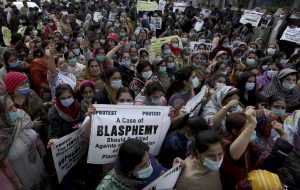Pakistani police arrested 24 people in overnight raids after a Hindu temple was set on fire and demolished by a mob led by supporters of a radical Islamist party, officials said on December 31.
Meanwhile, dozens of Hindus rallied in the southern port city of Karachi to demand the rebuilding of their place of worship.
The temple’s destruction on December 30 in the northwestern town of Karak also drew condemnation from human rights activists and leaders of Pakistan’s minority Hindu community.
Local police said they detained 24 people overnight and more raids were underway to arrest radical cleric Maulana Shareef and other individuals who participated or provoked the mob to demolish the temple.
The attack happened after members of the Hindu community received permission from local authorities to renovate the temple. According to police and witnesses, the mob was led by Shareef and supporters of Pakistan’s radical Jamiat Ulema-e-Islam party,
Angered over the attack, about 100 members of the Hindu community rallied in Karachi. Among them was Ramesh Kumar, a member of the National Assembly, the lower house of Parliament.
Kumar, also a Hindu leader, told demonstrators he received assurances from the government that their temple would be rebuilt and that those responsible for the attack would be arrested and punished.
Kumar said he received a call from Prime Minister Imran Khan and Khan expressed his sympathy. He said Khan assured him all steps will be taken to ensure the protection of minorities and their places of worship.
Kumar said Pakistan’s Supreme Court had sought a report from authorities about the attack, which also damaged a shrine located next to the temple. “We are very sad, our hearts are broken,” he said.
Kumar said the same temple had been damaged in 1997 and local clerics linked to this week’s attack had also incited Muslims previously. He claimed that Shareef, the local cleric who led the attack, had fled with armed men in tow and authorities ordered troops to capture them.
Earlier, Pakistan’s minister for religious affairs, Noorul Haq Qadri, called the attack on the temple “a conspiracy against sectarian harmony.” He took to Twitter Thursday, saying attacks on places of worship of minority religious groups are not allowed in Islam and “protection of religious freedom of minorities is our religious, constitutional, moral and national responsibility.”
The incident comes weeks after the government allowed Hindu residents to build a new temple in Islamabad on the recommendation of a council of clerics.
Although Muslims and Hindus generally live peacefully together in Pakistan, there have been other attacks on Hindu temples in recent years. Most of Pakistan’s minority Hindus migrated to India in 1947 when India was divided by Britain’s government.
By Riaz Khan and Mohammad Farooq for the Associated Press in Peshawar and Karachi, Pakistan.

































